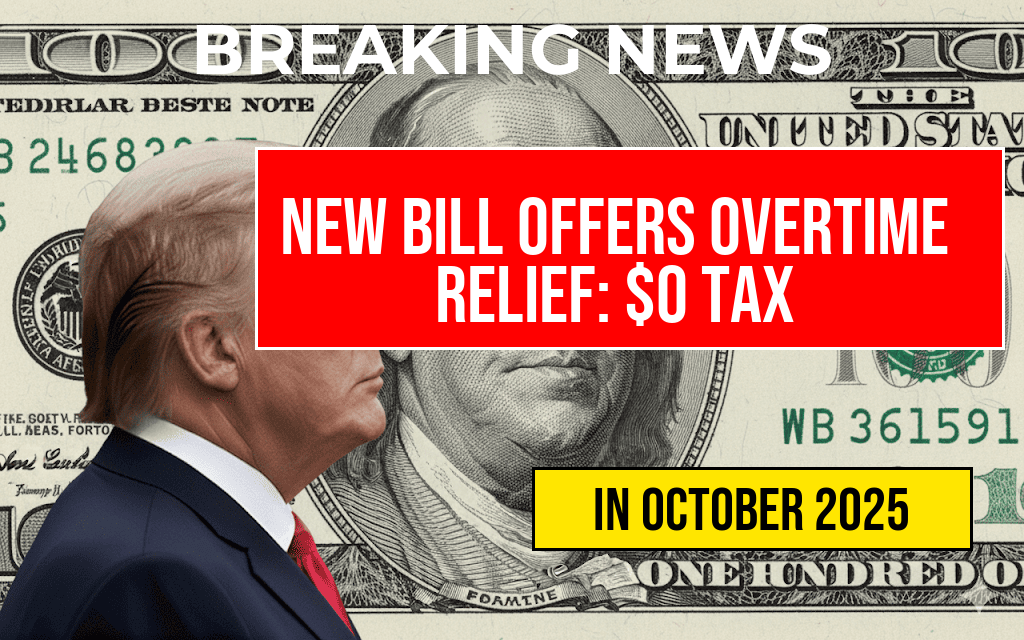A groundbreaking new bill has been introduced, promising significant overtime relief for American workers. The legislation aims to protect up to $12,500 of overtime earnings from taxation, allowing employees to retain more of their hard-earned money. As the labor market continues to evolve, this bill addresses the financial strain many workers face, particularly those who rely on overtime pay to support their families. With the potential to change the landscape of overtime compensation, employees across the country are eager to understand how their overtime earnings will be affected. This article delves into the specifics of the bill, its implications for workers, and the mechanics of how much of your overtime could become $0 taxable.
Understanding the New Overtime Bill
The new bill, introduced by a coalition of lawmakers, aims to redefine the taxation of overtime pay, particularly for those in lower and middle-income brackets. By setting a cap of $12,500 on taxable overtime, the legislation seeks to alleviate the financial burden on workers who often find themselves working extra hours to make ends meet. This development is a response to rising living costs and the increasing demand for fair compensation in the workforce.
Key Provisions of the Bill
- Tax Exemption Limit: Employees can now exclude up to $12,500 of their overtime earnings from taxable income.
- Eligibility Criteria: The bill is designed to benefit workers earning below a certain income threshold, ensuring that those who need it most receive the relief.
- Impact on Employers: Employers are encouraged to adjust their payroll systems to accommodate these changes, potentially leading to increased employee satisfaction and retention.
How the Tax Relief Works
Under the new bill, employees who work overtime will have a portion of their earnings exempt from federal income tax. Here’s how it works:
| Overtime Earnings | Taxable Amount |
|---|---|
| $10,000 | $0 |
| $12,500 | $0 |
| $15,000 | $2,500 |
| $20,000 | $7,500 |
This table illustrates how overtime earnings are taxed under the new legislation. For instance, if an employee earns $12,500 in overtime, they will not owe any federal income tax on that amount. However, any earnings exceeding this threshold will be subject to taxation, thus incentivizing workers to take on additional hours without facing excessive tax penalties.
Potential Impacts on Workers and Families
The introduction of this bill is expected to have far-reaching effects on American workers and their families. Many employees depend on overtime pay to cover essential expenses such as housing, childcare, and healthcare. By reducing the tax burden on overtime earnings, workers will be able to allocate more of their income toward these critical needs.
Supporting Evidence and Expert Opinions
Experts in labor economics have praised the bill for its potential to stimulate the economy by increasing disposable income for workers. According to a report from the Forbes, higher disposable income is linked to increased consumer spending, which can, in turn, boost local economies.
Additionally, labor unions have expressed strong support for this measure, arguing that it aligns with the ongoing fight for fair wages and worker rights. Union representatives believe that this bill is a step toward addressing income inequality and ensuring that all workers are compensated fairly for their efforts.
What’s Next?
The bill is currently under consideration in Congress, where it faces both support and opposition. Advocates are urging swift passage, emphasizing the urgent need for financial relief in a time of economic uncertainty. As the debate continues, workers across the nation are encouraged to stay informed about the bill’s progress and to reach out to their representatives to express their support.
For more information on the implications of this bill and its potential impact on your finances, you can visit Wikipedia or follow updates from reputable news sources.
Frequently Asked Questions
What is the purpose of the new bill regarding overtime relief?
The new bill aims to provide overtime relief by allowing workers to protect up to $12,500 of their overtime earnings from being taxed, thus reducing their overall tax liability.
How much of my overtime earnings can be protected under this bill?
Under the new legislation, you can protect up to $12,500 of your overtime earnings from taxation, meaning that this amount will be $0 taxable.
Who is eligible for the overtime relief provided by this bill?
Eligibility for the overtime relief typically includes workers who earn overtime pay and meet certain criteria outlined in the bill, which may vary based on your employment status and hours worked.
How does this bill impact my overall tax situation?
This bill can significantly impact your overall tax situation by reducing the amount of your overtime pay that is subject to tax, potentially lowering your tax bracket and resulting in higher take-home pay.
When does the bill go into effect?
The effective date of the new bill is specified in the legislation, and it is important to stay informed about when the overtime relief provisions will start to apply to ensure you benefit from the changes.






